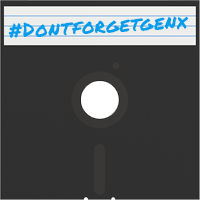Gen X: The Soundtrack of Success
The latchkey kids. The MTV generation. The cynical slackers.
Yeah, Generation X has heard it all. And they’re not impressed with what everyone thinks about them—often satisfied to be left out of the spotlight as they simply get the job done.
Sandwiched between the larger Baby Boomer and Millennial age groups, Gen X is frequently overlooked. But we’re channeling our Judd Nelson vibes, raising our fingerless-gloved fist high and telling nonprofit marketers, “Don’t, don’t, don’t you forget about them.”
RKD Group has commissioned research to gather much-needed insights about what drives Gen X—the next big cohort of wealth in North America. As more and more Baby Boomers shift into retirement age, Generation X stands poised to make the biggest impact on charitable giving in the coming decades.
We’re here to provide nonprofit marketers and fundraisers with a greater awareness of the differences in giving behavior, attitudes and core values among the three primary adult generations—Baby Boomers, Generation X and Millennials.

A Digital Divide
The biggest and most eye-opening finding of our research is that Generation X is actually two generations in one:
- Older Gen X: Born 1965-1973
- Younger Gen X: Born 1974-1983
The defining divide coincides with the rise of digital technology.
Put simply, Older Gen X reached adulthood in a mostly analog world. Younger Gen X had their childhood and adolescence defined by home computers and the screech of dial-up modems connecting to the internet.
“You’ve got mail” had a different meaning for these two groups. And, as we’ll see in the data, these differences affect their behaviors and attitudes. Older Gen Xers see the world more like Baby Boomers, while Younger Gen Xers often align with Millennials.
Understanding this split will help nonprofit organizations align their marketing and fundraising to connect with Gen X donors.

Donor Personas
Understanding the Generations
In our research, we uncovered the charitable giving behavior of each generation. We also discovered the attitudes and core values—typically influenced by their childhood environments—that drive those behaviors. Putting them all together, we've developed these donor personas for each of the four age groups:
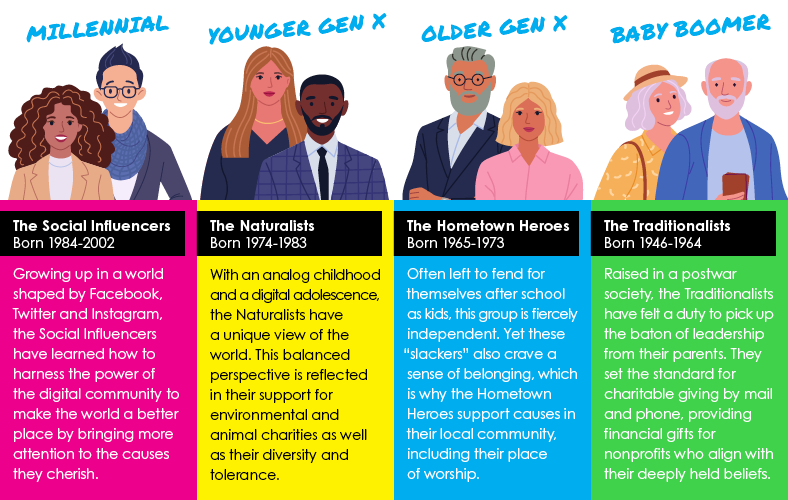
Giving Behavior by Generation
Charitable Gifts
Let’s start by looking at how much each generation gives to charity.
On the surface, it might appear that Baby Boomers are the most generous, but giving levels among the four groups are very similar when we take into account average household income. As more Baby Boomers ease into retirement, their annual income has declined. Meanwhile, Younger Gen Xers are bringing in the most income.
Causes Supported
With a basic understanding of how much each generation has to give and is willing to give, the next question is: "Where do they donate their hard-earned money?"
Here is where we begin to see Older Gen X align with Baby Boomers and Younger Gen X align more with Millennials.
We see a strong affinity for food banks across all groups, which was clearly reflected in the widespread support food banks received from donors during the COVID-19 pandemic. Both Younger and Older Gen Xers also support cancer research and hospitals.
But that’s where the similarities end.
The two older generations are much more committed to faith-based causes. This matches a long-term trend of changing attitudes toward religion in the United States. Younger Gen X begins to tail off a bit in supporting places of worship, and less than a third are interested in supporting faith-specific charities. The numbers for Millennials are significantly lower.
Older Gen Xers and Baby Boomers are also more likely to support veterans' causes than the younger pair.
Meanwhile, Younger Gen Xers and Millennials—having grown up in a world of climate change—show a stronger connection to environmental organizations as well as national and state parks. The younger two generations are also more likely to support animal welfare organizations.
Gifts by Method
The types of causes supported by different generations show clear differences between Younger and Older Gen Xers. The same can be said for the ways in which they give.
All four generations showed similar response to a nonprofit’s website, TV appeals and email. Overall, social media was the strongest source of appeal among all generations—but stronger for Millennials and Younger Gen X.
The younger generations were also far more likely to respond to an appeal they first saw online. Older Gen Xers and Baby Boomers were more likely to respond via direct mail or telemarketing.
We also asked donors about their interest in newer and evolving forms of giving.
Older Gen Xers and Boomers showed far more interest in donor-advised funds than their younger cohorts. Younger Gen Xers and Millennials showed far more support for Kickstarter campaigns and cause-sensitive companies—the latter representing a growing trend in the for-profit industry.
Emerging Forms Defined:
- GoFundme: A person being featured in a "GoFundMe" appeal (Crowdfunding platform helping individuals)
- Community Foundation: The foundation researches and funds nonprofits they deem effective within that community
- DAF: Donor Advised Fund. Depositing money into an account and getting tax deductions, choosing which charities to give to later.
- Kickstarter: Typically funded on the web, supporting a cause they believe in.
- Cause-Sensitive For-profit company stocks: Cause could be land conservation, community food and service, or other societal goals.
- Family Foundation: Establishing a fund that gives 5% of its non-taxed gains away every year, to charities of the family members' choosing.
Age is also a Factor
Knowing which causes are important to each generation and where donors prefer to give can help nonprofit organizations target the right donors. And getting the right message to them early on is essential, because age becomes more of a key factor than generational preferences.
For example, the total number of charities supported declines with age. As donors get older, the data shows that they narrow their focus and give bigger gifts to fewer organizations.
Donors also become more committed to their causes and are less likely to switch their support the older they are. Eventually, this pattern leads to planned giving and bequests.
Reasons for Giving... or Not Giving
Digging a little deeper, we asked donors why they chose to support the organizations to which they had given in the last two years. Unsurprisingly, belief in the cause or purpose was overwhelmingly the top reason, across generations.
From there, we see another significant split.
Older Gen Xers and Baby Boomers indicated more interest in the traditional support model of making a financial contribution and receiving impact reports of the work being done by the organization.
Younger Gen Xers and Millennials—far more immersed in the realm of social media influencers—showed a strong affinity for helping to increase the clout and reach of nonprofits.
Just as important are the motivations for why donors choose not to support a nonprofit organization. The reasons are many and varied, but we see some similar patterns emerge once again.
The biggest reason for losing support—which should be on every nonprofit’s radar—is mission drift. It is essential for charitable organizations to stay true to their cause and values.
Millennials and Younger Gen Xers feel strongly that the government should use tax dollars to provide services instead of leaving them to nonprofits. When compared to Older Gen X and Baby Boomers, the younger pair also show a far more pessimistic view of nonprofits:
- Charities don’t let donors specify where donations go
- Nonprofits treat the symptoms instead of the core problems
- They don’t keep up with new ways to accomplish their missions
- They don’t develop new ways to earn money
Generational Attitudes
Outlook on Life
Unlike with behavior, Gen X as a whole stands alone in their outlook on life. Here, the data shows Millennials and Baby Boomers more aligned with how they view life and their upbringing.
All four generations feel their parents played a big role in who they are today, with 70% of respondents supporting the statement overall. But Gen Xers were less inclined to agree with the statement. And they show a more skeptical and cynical view from here.
Millennials and Baby Boomers were more likely to say:
- I feel like my life is heading in the right direction
- My generation has more than its fair share of naturally born leaders
Gen Xers were more likely to say:
- Many who know me would say I'm just naturally skeptical
- I resent how little time my parents spent with me growing up
This ties back to the concept of “latchkey kids.” Generation X was born between 1965 and 1983, a time in which the traditional family model began to change. This transformation left more children to look after themselves with less parental supervision.
Perception
Again, Gen X stuck together when it comes to how they're perceived in the media. Gen Xers don’t feel they’re portrayed accurately.
Yet Younger Gen Xers aligned with Millennials in feeling like a good fit with how the world views them. Older Gen Xers were least likely to agree with this, and they also strongly believe that they’re not getting enough attention (80%).
Culture and Diversity
Younger Gen Xers clearly align strongly with Millennials in their attitudes toward culture and diversity. Those under 45 are coming to terms with a more pluralistic society in America, and they’re engaging more fully with its impact.
About half of Baby Boomers acknowledge that America represents a widespread diversity of cultures, religions and customs, but the majority do not have friends of different backgrounds or believe in tolerating beliefs that don’t match their own.
Older Gen Xers are caught somewhat in the middle. Most accept today’s diversity in America and believe in tolerance of others’ beliefs. Yet fewer than half have friends with different ethnic backgrounds, and only a third feel laws should encourage diversity.
Patriotism
Not surprisingly, patriotism is strongest among Baby Boomers, who were raised in the aftermath of World War II. They strongly believe America is the greatest country in the world, but they are least likely to discuss these views with others.
From here, the declining percentages coincide with age. The majority of Millennials, the youngest group, do not believe in American Exceptionalism, and they are the most willing to share these views with others.
Core Values
Dynamic Tensions
Academic and business studies across the globe in the past 30 years have identified several core value dimensions, with four strong dynamic tensions:
- Self-reliance vs. caring about others
- Embracing change vs. desiring security
- Adventurous vs. responsible
- Being a leader vs. being part of a team
Our research included a short battery of questions based on items that were verified as dynamically opposite each other. We asked which were “more” important in different contexts: In their lives, when at work, when they volunteer or give, etc.
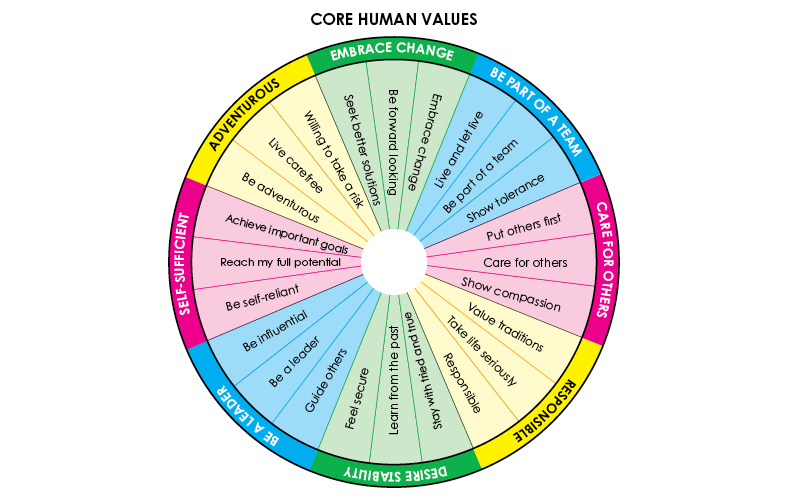
Comparing Generations
Compiling these responses, we see a split once again between Younger Gen X and Older Gen X:
- Younger Gen X embraces change, tolerance and self-reliance
- Older Gen X prefers stability, traditions, responsibility and compassion
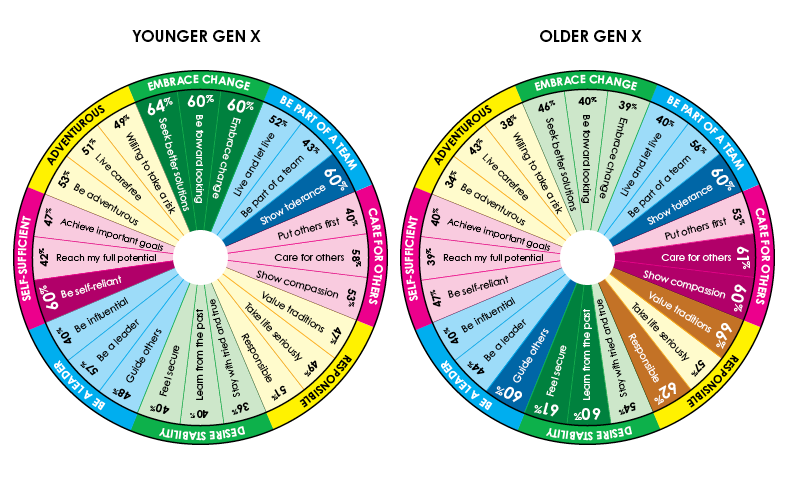
Older Gen Xers align very strongly with Baby Boomers when it comes to their core values. Both groups are more interested in caring for others vs. self-sufficiency, and both prefer stability, security, responsibility and tradition over values like adventure, risk, change and innovation.
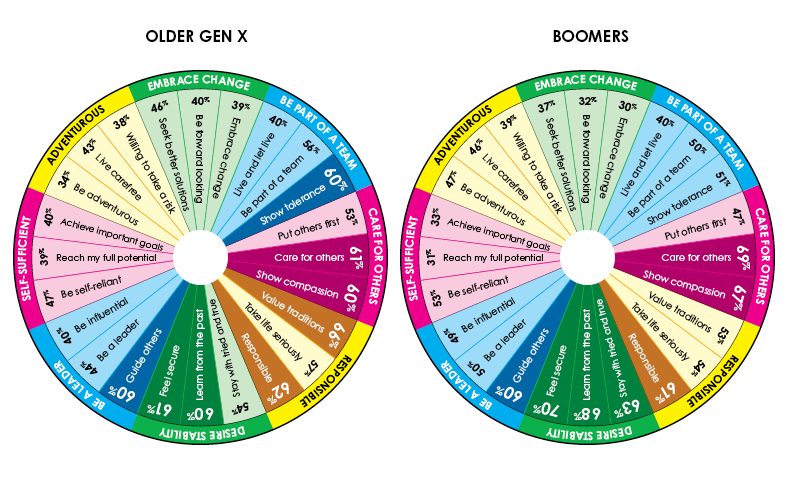
Younger Gen Xers—who had an analog childhood and a digital adolescence—show a greater balance in values than any other group. They’re split between leadership and teamwork, adventure and responsibility, and self-sufficiency and care for others.
When we compare all generations, we see that Younger Gen X aligns most closely with Millennials, particularly when it comes to embracing change vs. stability.
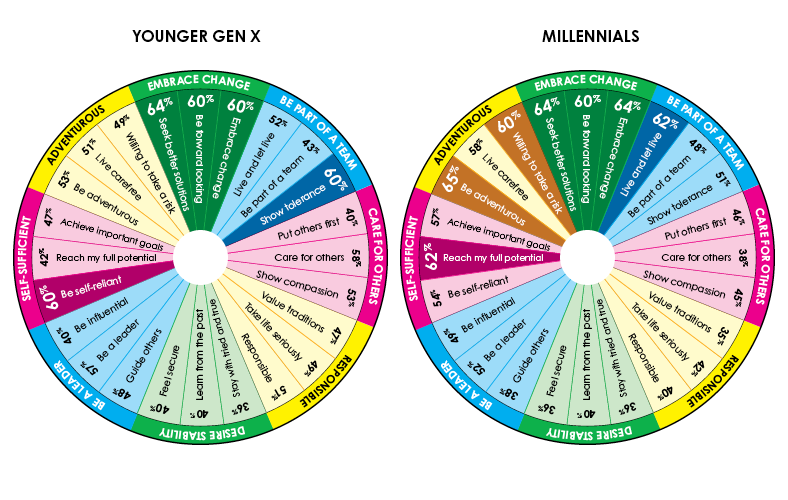
Background
About the Research
The data in this report comes from an online survey of 2,000 U.S. donors, commissioned by RKD Group. This study was conducted in March 2020 by McQueen Mackin & Associates, a market research firm that is dedicated to helping nonprofit organizations do more good and make a greater impact.
Survey respondents make up a nationally representative sample of people who gave at least $100 in the previous calendar year as determined by Qualtrics, an online research organization. The survey was controlled for sex (50% men, 50% women) and age (33% each of Millennials, Generation X and Baby Boomers) as well as education and race/ethnicity. Additional controls were put in place to ensure that inaccurate and repeat responses were excluded.
Respondents were asked a series of questions about their generational giving behavior, attitudes and core values. Findings were written and prepared by RKD Group.
About RKD Group
RKD Group is a leading fundraising and marketing services provider to hundreds of nonprofit organizations. RKD Group's multichannel approach leverages technology, advanced data science and award-winning strategic and creative leadership to accelerate net revenue growth, build long-term donor relationships and drive online and offline engagements and donations. With a growing team of professionals, RKD Group creates breakthroughs never thought possible. For additional information, visit RKDGroup.com.


.png?width=800&height=400&name=RKD-logo-red-tm%20(1).png)
